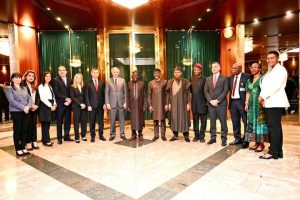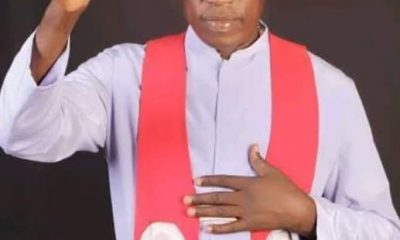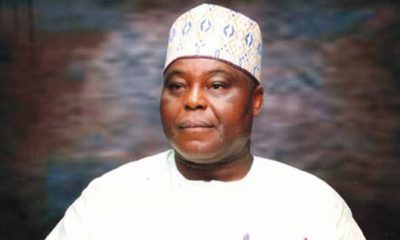News
The Afonja in Niger Republic

By Lasisi Olagunju
(Published in the Nigerian Tribune on Monday, 31 July, 2023)
Six contiguous states across Africa, from Guinea on the Atlantic Ocean to Sudan on the Red Sea, have suffered eight military coups since 2020. The United States Institute for Peace (USIP) noted and wrote the above in relation to last week’s coup in Niger Republic.
It described the situation as depressing. It is. Depressing means upsetting and distressing, painful. It also means disheartening, heartbreaking and heart-rending. Each of those words will fit an experience of betrayal where trust is invested. Ousted President Mohamed Bazoum would use those words too, especially when it was announced that the head of his guards was the one who sacked him. The violent process is called coup d’etat; Napoleon Bonaparte did it after his Egyptian military campaign in October 1799; it crowned him emperor, a virtual dictator in 1804.
Coups are sometimes redemptive and corrective; they are many times ruinous. The December 1, 1983 issue of the Nigerian Tribune carried a front page story headlined: ‘Metroline takes off in 1984.’ It was about Lagos State and the UPN government there thinking ahead. Exactly one month after that report, a coup d’etat killed the metroline dream; the result is the intractable snarled-up Lagos traffic we feel today. When the Nigerien coup story broke last week, I asked a reporter in his late 20s what he knew about coups de’tat. He started ‘blowing’ grammar but I understood his limited knowledge of what I asked. To him, coup was a mere subject of discussion; to my generation, it is a lived experience, a permanent scar. I told the young man of our experience in the 1970s, 1980s and the ’90s when we slept under a ‘regime of hope’ and woke up with ‘renewed hope’ under another regime without having a say in who ruled us and for how long.
The last time we experienced a coup was November 1993, about thirty years ago. ‘Impunity’ and ‘arbitrariness’ were the words the young man used to qualify what I described. He was right. What rules coups is not the law as we know it. It has its own rule, its own morality – might is right, what Charles Darwin (and Herbert Spencer) called “survival of the fittest…an overthrowing of the moving equilibrium wherever it presents the least opposing force…” It is a capricious supplanting of the Rule of Law with the rule of men in its crudest form.
Edward Luttwak, in chapter 2 of his ‘Coup D’etat: A Practical Handbook’ (first published in 1968, republished in 1979, updated and republished in April 2016), identifies what he calls conditions that predispose countries to a violent change of government. He lists “a passivity of enforced silence, not inertia”, economic distress, and insecurity among such vulnerabilities (page 22). Were those conditions present in Niger Republic before last week? If they were, how innocent were the coup leaders in the making of the deterioration which now summoned their intervention?
The new leader has been an inner part of the system since 2011. He is on record as “a staunch ally” of Bazoum’s mentor and predecessor, Mahamadou Issoufou; he is still very close to him. He was very close to Bazoum until recently. When you are complicit in the making of a problem, would you not be insulting the intelligence of your audience if you advertise and hold yourself out as the solution?
Coup is the political equivalent of armed wife snatching, an act that knows no friend because it is war. In that zero-sum game of power, every actor is a serpent and the closest is always the most poisonous. General Abdourahamane Tchiani, Niger’s coup leader, was the commander of the elite presidential guard. His job was to protect the man he sacked and detained in an apparent preemptive strike. The coupist had an ancestor in Nigeria: Colonel (later Brigadier) Joseph Nanven Garba was made the commander of the Nigerian elite Brigade of Guards at Dodan Barracks in Lagos in the middle of the Nigerian Civil War. He was in charge of the personal security of the then Head of State, General Yakubu Gowon. Like Tchiani, Garba did the work admirably for almost a decade. Then on May 29, 1975, General Gowon was overthrown in a military coup announced by his chief guard – the same Joe Garba.
In Mali, a certain Colonel Assimi Goita was in the news on August 18, 2020 for seizing power which he soon ceded to transitional President Bah Ndaw. Goita was back nine months later in May 2021 announcing that he had seized power from President Ndaw and Prime Minister Moctar Ouane. He proceeded to detain the duo and became interim president and has remained in power since.
What is the meaning of interim? The September 2022 coup in Burkina Faso threw up Captain Ibrahim Traore who was a key participant in the January 2022 coup that enthroned the man he sacked, Lt-Col Paul Henri Sandaogo Damiba. That act of a comrade toppling another comrade was consistent with the political history of the Burkinabe. On Thursday, 15 October, 1987, the leader who renamed the country Burkina Faso, Captain Thomas Sankara, was shot dead outside the central parliament building in Ouagadougou. It was his best friend, colleague and comrade, Blaise Compaore, who was behind his death. Someone reviewed the Sankara tragedy and warned: beware of best friends.
It is not really strange that the man who sacked his president in Niger was in fact the man in charge of the president’s life and throne. Sadly, it is the way of life, and especially of power. You can’t slap someone unless you are close to the person. I counsel all leaders to choose their men with their mind’s eyes open. Whenever events like the Nigerien ‘betrayal’ happen, the Yoruba would quickly remember a head of their army, Aare Ona Kakanfo Afonja of Ilorin, who staged a coup against his lord, the Alaafin, in 1817, forced him out of power and out of life. Like the Arab Spring, the Afonja rebellion serially infected the whole of the Yoruba country with convulsions; the nation caved in to a pandemic of revolts and coups. But Afonja himself soon became a victim of his ambition.
Like Afonja, like Tchiani. The new man in Niger Republic is said to be very brave and popular among his soldiers. He holds himself out as a people’s General. Reports describe him as a veteran pro-democracy officer “who has foiled similar uprisings” in his country in recent past. He was, in fact, the one who foiled a plot to prevent Bazoum from being sworn in in April 2021. Ambitious people always speak the language of freedom. Afonja was a ‘freedom fighter’ hailed initially for standing up to the excesses of Alaafin Aole. He later built a formidable army of forcibly freed Oyo slaves of northern origin. He encouraged the enslaved to desert their owners, gave them freedom, courage and arms. He needed them for his protection but, like he did to the Alaafin, those he cultivated for his defence turned out his nemesis. Afonja fell six years after his coup at the mutinous hands of his soldiers. He was attacked, assailed, defeated and killed one very bad afternoon in 1823 by his ex-men. His attackers were not satisfied with just killing him; they burnt his corpse, denying him a decent burial. What happened to Afonja was a coup that has endured till tomorrow.
Death that is serially killing one’s age mates is dropping a sneaky heads-up in deep proverbs. We should understand the blue-murder cries across Africa’s presidential palaces over the coup in Niger. Rebellion is like yawning; it is contagious. When Gowon was removed in July 1975, the New York Times noted that he was “the seventh African head of government to be deposed in two years.” The newspaper reported that “the previous changes in government had come in Rwanda, Upper Volta, Niger, Ethiopia, Madagascar and Chad.”
Two American political scientists, Nathan Danneman and Emily Hencken Ritter, in 2014 looked at the Arab Spring and came out with a paper they entitled ‘Contagious Rebellion and Preemptive Repression.’ They noted that “rebellions in Tunisia (which was) followed soon after by challenges in Egypt, Syria, and Libya” suggested “the contagious nature of civil conflict.”
Rebellion in the neighborhood, they held, “make citizens more likely to rebel at home.” In politics, as in revolutions, one thing almost always leads to another. We saw it with the 1776 American revolt against British rule; it was followed in 1789 by the French battle for independence. The fall of the Berlin Wall in 1989 ignited a chain of events which altered the course of events in Eastern Europe. That is why the USIP (United States Institute for Peace) is alarmed that eight African countries in 2023 share not just common borders and insecurity but also anti-democratic behaviour.
If you’ve been bitten by a snake before, every twerking, slithering creature would be treated as a snake. French president, Emmanuel Macron, looked deeply at what happened and declared that “this coup is completely illegitimate and profoundly dangerous for Nigeriens, for Niger and for the whole region.” If an earthworm moves like a snake, kill it as you will kill a snake.
Lovers of democracy in Africa should pay attention to these events. The Yoruba have many words of warning; one of them tells the careless to watch out for the dangers which pointed sticks pose to their eyes (igi ganganran má gún mi l’ójú, òkèèrè l’ati í lòó). You escape being blinded by being proactive.
A stich in time saves nine. The ousted Nigerien leader appeared never to have heard that saying before his sack. The coup leader, Tchiani, had reportedly developed a cold war with Bazoum, his Commander-in-Chief, repeatedly “shunning official ceremonies and activities” where the president was present.
He was sending his deputy, Colonel Ibroh Amadou Bacharou, who is now solidly with him in this coup. What did the toppled president do? He was reportedly considering a sack of the General. He went to sleep with a python in his rafters. The sensible would tell him that very few have ever put a date to their enemy’s death and lived to carry it out.
War chiefs can be very uncontrollable and subversive. A particular Balogun some 200 years ago controlled Ilorin and resisted his Emir as it pleased him. It took the direct intervention of the British to put him and the other Baloguns down for the emir to breathe. There were several of such men in Ibadan history. In Ilorin, it was worse. The war chiefs actively competed for power and influence with the emirs, even demanding their removal and death – exactly as Afonja did with Alaafin Aole. But Lugard at a point resolved to address the question of the powers of the Baloguns in Ilorin. Colonial records say that in September 1900, Lugard wrote to the Resident in Ilorin on the need to deal with “the most ill-disposed” of the Baloguns as a lesson to others: “I should be glad if you would accumulate a case against (Balogun) Alanamu (or whoever is the worst) without letting it be known that you are so doing”…then ‘arrest and probably deport him” (See Danmole and Falola’s ‘The Documentation of Ilorin by Samuel Ojo Bada’. 1993: 9). What Lugard said he would do, he did to that Balogun. My people say when you kill iji in the presence of ìjì, ìjì will know its place and how much it weighs.
ECOWAS on Sunday slammed border closure on Niger because of the coup there. Let us look at the political map of that country. It is bordered in the north by non-ECOWAS members, Libya and Algeria. It is bordered by Benin and Nigeria in the south where local people along the borders share farms and streams with their kin on Niger’s side. Niger also shares borders with Burkina Faso in the southeast, with Mali in the west, and with Chad in the east. Is ECOWAS aware that all these countries are, like Niger, under military rule? So, how effective will the closure be?
It is gratifying to see the whole world rejecting what happened in Niger. Niger’s old master, France, has stopped all aids to the country; the European Union has halted all help; the United States has talked tough in support of democracy even as it threads the needle with utmost care. It has to; otherwise, the bad child will run out into the warm bosom of seductive Russia.
The big lesson in the whole tragedy is that democracies will endure only when it serves the people and serves them well.
Coup-endorsing videos of street jubilation and attacks on politicians, their property and symbols of democracy in Niger Republic are a distressing spectacle.
Democracy may be painfully problematic in Africa, but it is still the strongest bulwark against the buffettings of arbitrariness and misrule.
Business
Tinubu assures of better business environment as Coca Cola announces $1billion investment in Nigeria

President Bola Tinubu has reiterated his administration’s commitment to creating a robust financial system and a business-friendly economy that will attract more foreign direct investments.

The President made the commitment on Thursday in Abuja, as the Coca-Cola Company announced plans to invest $1 billion in Nigeria over the next five years.
According to a statement by Chief Bayo Onanuga, Special Adviser to the President on Information and Strategy, the announcement was made at a meeting between the President and the global leadership team of Coca-Cola Company, led by Mr John Murphy, its president and chief financial officer, and the Chairman of Nigerian Bottling Company, Ambassador Segun Apata.
The statement which Nationwide Reports obtained Thursday, added that President Tinubu commended Coca-Cola for its long-standing partnership with Nigeria and for promoting investment opportunities that have employed over 3000 people across nine production facilities.
”We are business-friendly, and as I said at my inauguration, we must create an environment of easy-in and easy-out for businesses.
”We are building a financial system where you can invest, re-invest, and repatriate all your dividends. I have a firm belief in that,” he said.
President Tinubu told the delegation that private sector partnerships, which sustain investments, are central to his government’s far-reaching reforms to improve the business environment.
He pledged that the government would continue partnering with Coca-Cola to expand investments in Nigeria and address environmental issues, including climate change.
”The size of this country is enormous in Africa, and the consumption capacity of Nigeria is expanding daily,” President Tinubu added while commending the company for scaling up its skill development and community initiatives as part of its corporate social responsibility.
Presenting an overview of Coca-Cola’s business in Nigeria, Murphy noted that the company generates N320 billion annually through nearly 300,000 customers and contributes almost N90 billion in revenue to the Nigerian government.
”We are very proud of the growth of the business over a long period and its impact on the daily lives of many Nigerians.
”Beyond the financial impacts, we are also very committed to supporting the communities, and over the last number of years, we’ve had a special focus on several areas in the world of sustainability, water packaging and others, ” he said.
Mr Zoran Bogdanovic, CEO of Coca-Cola Hellenic Bottling Company, explained that the company’s confidence in Nigerian government policies had encouraged it to make the $1 billion investment pledge.
”Mr President, in your inaugural address, we were very pleased to hear of your invitation for foreign investors to invest and your assurance that foreign businesses can repatriate dividends and profits.
”That assurance gives us the confidence to continue our investments. Since 2013, we have invested $ 1.5 billion in Nigeria in capacity expansion, transformation of our supply chain infrastructure capabilities, training and development.
”I am very pleased to announce that, with a predictable and enabling environment in place, we plan to invest an additional $1 billion over the next five years.
”We believe Nigeria’s potential is tremendous, and we are committed to working with the government to realise this potential,” he said.
News
NSITF wants Employees Compenstion Scheme for all casual construction workers

The Nigeria Social Insurance Trust Fund, NSITF has called for a joint taskforce with the Federation of Construction Industry (FOCI) to ensure that all casual workers in the sector are covered by the Employees Compensation Scheme (ECS).
Delivering keynote address at the 68th Annual General Meeting of the Federation today in Abuja, the Managing Director of the NSITF, Oluwaseun Faleye frowned at the situation where thousands of casual workers in the construction industry are left outside the coverage of the ECS with the attendant consequence of abandonment in the event of workplace accidents or death. He described it as a dire anti-worker situation, which poses a huge risk to the foundation of safety in the world of work.
He said, “I want to bring your attention to an issue that requires our immediate and collective action, and that is the coverage of casual workers under the ECS.
“Currently, our practice ensures that contract staff are covered by the ECS. But what about our casual workers? These individuals face the same risks, breathe the same dust, and contribute equally to the progress of our projects. Yet, they stand outside the protective umbrella of our scheme. This disparity is not just unfair; it’s a risk to the very foundations of safety we’re trying to build.
“I therefore call for change. The NSITF is open to finding solutions, but we need your help, your expertise, and your commitment. We want FOCI to partner with us in developing strategies to ensure that all construction workers – regardless of their employment status – are adequately covered by the ECS.
“This is not just about compliance; it’s about values. It’s about recognizing the worth and dignity of every individual who contributes to building our nation. It’s about living up to the ideals that we, as industry leaders, profess to uphold.
“I propose that we form a joint task force between NSITF and FOCI to tackle this issue head-on. Let’s explore innovative solutions – perhaps a flexible premium structure or a pooled resource model. Our management team is ready to sit down with you, to listen, to brainstorm, and to implement practical solutions that work for everyone.”
In a statement Thursday, Nwachukwu Godson, General Manager, Corporate Affairs, quoted Faleye to have stated that steps must be taken to protect the dignity and safety of every individual worker as a pivotal requirement in building a resilient national workforce. Faleye also described the ECS as a safety net and springboard, fostering a culture of workplace responsibility while encouraging best practices in occupational health.
He further charged all construction companies to improve the safety and health standards of their workers, saying that the unenviable record of preventable workplace accidents in the sector cannot be ignored.
“The construction sector, along with manufacturing, has historically held an unenviable record of preventable work accidents in Nigeria. This is a stark reality we can no longer ignore. Our records at NSITF show that a disproportionate number of our interventions for accident victims and work-related fatalities come from these sectors.”
He therefore urged the sector to apply cutting-edge factors that influence the dynamics of safety and health in their operations.
Meanwhile, the NSITF has reiterated its commitment to strengthening collaboration with the Nigeria Employers’ Consultative Association (NECA).
The Managing Director, Oluwaseun Faleye, stated this during a courtesy visit by the Director General of NECA, Mr. Adewale Smart Oyerinde, at the headquarters of the Fund , Wednesday.
Mr. Faleye pledged to expand all ongoing initiatives, including the flagship Safe Work Intervention Project, which aims to reward best safety practices and improve workplace safety across Nigeria.
He noted that stronger ties between the two institutions are critical in advancing labour relations and social security for Nigerian workers.
He further acknowledged the pivotal role of NECA as a tripartite partner in the management board of the NSITF, noting that the symbiotic relationship between the two institutions has been pivotal in promoting workplace safety as a basic factor in optimizing national productivity, further commending NECA for providing stability to the national economy.
“I applaud NECA’s consistency in pushing the cause of employers especially on issues relating to inflation, interest rate and the high energy cost and other issues key to the employers. We appreciate this because, for us as much as we are interested in the social safety net that we provide from our mandate, we also need businesses to thrive; we need businesses to be alive to employ. It’s in that process that we are also able to execute our mandate.”
Mr. Oyerinde, in his response, commended NSITF’s leadership under Mr. Faleye, noting that NECA’s partnership with the Fund is vital for ensuring sustainable employment relations.
“We will continue to engage, but I wish to first congratulate you on this important appointment. This is a very big time in the life of all of us, in the life of businesses and the survival of the fund as it were. We are fully committed to working with the NSITF to make sure that every worker in Nigeria has access to a safe and secure work environment,” he said.
He also reaffirmed NECA’s dedication to supporting the Fund’s initiatives aimed at reducing workplace risks, enhancing employer compliance, and improved safety standards.
News
Zamfara Gov Dauda Lawal accuses predecessor Matawalle of complicity in banditry, fund mismanagement

The Governor of Zamfara State, Dauda Lawal, has alleged that his predecessor, Bello Matawalle, was fully involved in banditry issues plaguing the state.
He made the allegation while speaking on a TVC politics programme on Wednesday night and claimed that, based on information at his disposal, his predecessor led a government that was complicit with bandits.
Lawal also accused the previous administration, headed by Bello who is now the Minister of State for Defence, of misappropriating state funds and handling insecurity with leniency.
“Yes, there were a lot of issues in the past with my predecessor. In fact, let me state this very categorically: if I were him (Matawalle), I would resign and face all the allegations against me, which would have been more honourable. From all the information we are receiving, my predecessor (Matawalle) was fully involved in some of these banditry issues,” Lawal stated.
Justifying his claim that his predecessor was implicated in the banditry, he recounted how a permanent secretary under Matawalle’s administration paid ransom through the Government House to secure the release of his children, who had been abducted by bandits.
The governor said, “A typical example is the permanent secretary whose children were abducted, and it was unfortunate that he had to pay ransom through the Government House. It was also very clear, based on all the allegations, that bandits were being sheltered at the Government House. And there were many other issues.”
He added that, if he were Matawalle, he would have resigned to clear his name of all allegations.
“So, for me, honestly, if I were him, I would step aside and face these allegations until my name is cleared, before returning to continue my job. How can you imagine such allegations against him, and yet he remains the Minister of Defence? I mean, that is unfair. This man could have been honourable, stepped aside, faced the allegations, cleared his name, and then come back to continue his job,” Lawal stated.
He added that his predecessor’s file was before the Economic and Financial Crimes Commission and expressed surprise that the same person had been cleared by lawmakers and security agencies for the post of minister.
“In May 2023, there was an allegation of misappropriating over ₦70 billion, and when we took over, we realised that ₦70 billion was a small fraction compared to the rot on the ground. All this information was before the EFCC, and I wondered how this man was cleared by the security agencies before being confirmed as a minister. If I were him, I would face the EFCC and say, ‘Look, let me clear my name.’
“This is a man with 41 children, and for goodness’ sake, what kind of legacy is he going to leave for his children when he is being accused of misappropriating such a large sum? He should have come forward, faced the EFCC, and cleared his name.
“But we are still waiting to hear from the EFCC, and the case has been ongoing for over a year now. Meanwhile, this is the people’s money we are talking about. We need this money in Zamfara with all the challenges we are facing, including financial constraints. At the very least, let’s recover some of this money for Zamfara so that we can work for the people of the state,” Lawal concluded.
-

 News1 year ago
News1 year agoBreaking: Tinubu’s authentic ministerial nominees
-

 News1 year ago
News1 year ago“Anytime we want to kill terrorists, President would ask us to take permission from France but they were killing our soldiers-” Niger Republic coup leader
-

 News11 months ago
News11 months ago“I’m leaving the Catholic church because Bishop Onah is oppressing me,” says Okunerere
-

 News1 year ago
News1 year agoDokpesi and the Gazebo Mystique
-

 News1 year ago
News1 year agoRadio Nigeria’s veteran broadcaster Kelvin Ugwu dies three months after retirement from service
-

 News5 months ago
News5 months agoPersons against Allagoa’s reforms behind protests at NSITF
-

 News1 year ago
News1 year agoTsunami: Tinubu orders dissolution of managements, boards of MDAs, to sack all Buhari’s political appointees
-

 News1 year ago
News1 year agoLast minutes fever: Nigerian Hunters Service optimistic as Buhari signs five Bills into law

